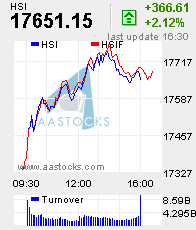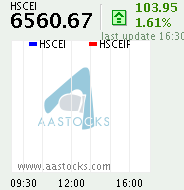The Paradox of the Interest Rate Hike Policy adopted by the People's Bank of China --- Investors shrug off the possible tumble in shares
The news that has dominated the media in the last few days has been the People's Bank of China's announcement that it's raising interest rates. The country's central bank surprised us by raising the benchmark interest rates by 0.27%, to 5.58% for lending and 2.5% for deposits. The measures are widely regarded as the Government's latest measure to curb inflation now running in excess of 5%.
The State Information Centre says the interest rate hike has at least three merits:
"First of all, it will help to ease the over-heated investment in fixed assets and help to consolidate China's macro-economic control efforts; Second, it will help stabilize Chinese people's saving accounts; and Third, it will help contain the bubble in China's real estate sector."
However, I think the Central Bank's decision is more symbolic than anything else.
The Chinese Government is determined to adopt market mechanism (invisible hand) rather than administrative orders (visible hand) for resource allocation and achieving the goal of macro-economic controls. This is the distinct feature of the "Wen" market today. (Wen= Wen Jiabao, our premier of the State Council)
As the officials of the People's Bank of China said, "the main purpose of the interest rate rise is to cement current macro-control achievements and curb inflation by using market-based mechanism." Obviously, that is a good thing in this direction in terms of economic sense. However, the outcome is yet to be insignificant up to now. The effect was not substantial or even seemingly going to the opposite side. The stock market is still bullish yet and market indices are still hiking. Frenzy “gold rush” in the stock market may prevail despite the overheated economy.
In view of the rate-hiking policy, are the participants of the stock market behaving rational or irrational? We still assume they are rational in terms of economic deductive reasoning. They are not stupid guys. In addition to the low interest elasticity of investment in China, it is mainly due to the “yield rate” earned from the stock investment probably far exceeding the “savings interest rate” paid by the banks. Therefore, most citizens think that they are still wise to channel their liquidity (money) into the stock market. Off course, all potential and substantial returns glue with corresponding risks. It is still justifiable. The cooling down or the adjustment of the economy is better to be directed by the invisible hand of market that leads to efficient allocation of resources.
This of course is also attributable to the China's so-called monetary policy. That is, to a certain extent, the Chinese Renminbi is indirectly pegged to the US dollar (even though the Chinese authority never admits this). Our country now hold about 1.2 trillion U.S. dollars reserves and it consequently leads to a dramatic increase in the money supply. The result is the economic bubble as too much liquidity (money) chasing limited amount of resources. The result is the rise in the nominal value of all assets and booming market prevails. However, the financial crisis later follows.
I think this recent rate hike in China is only the beginning. However, the specific increase would not be sufficient to change the overheating situation of our country’s real estate market. No doubt, our country’s economy is overheating and the “bubble” is forming. It will be getting larger and larger. Definitely, it must be and yet to “burst” in the future. However, when to “burst” is God knows.
It is something likely to follow the Buddhist as well as the Taoist philosophical ways of thinking that “every consequence has its own cause”. Let us calm and well prepare to face the change. “Change is Eternal”. It is both an opportunity as well as a challenge. The best moment is also the worst moment when the moment of great era comes, I think.
P.S. The number of the registered security accounts is just over 100 million in China that far more than the total number of the CCP members now!
P.P.S. One of the AL Economics questions asked this year:
“What is normative economics? In what exact sense is it not a science?”
The following is quoted from Armen A.Alchian ---------
Economic science is "positive", not "normative". It's strictly an "If this, then that" form of analysis. It helps only to understand consequences. It contains no basis for deciding what is good or bad, commendable or condemnable. In this respect, it’s like Physics and Chemistry and Biology. For example, principles of chemistry explain what happens if you add some iron filings into some sulfuric acid, or if you toss a match into a pile of paper, but it does not tell whether you should add the filings or toss the match. Physics does not imply carbon is better than lithium, or that heavier elements are better than lighter ones, nor does Economics tell us governments should be smaller rather than larger, or that taxes should be lower or higher. Similarly, economics can tell you the consequences of some law or event. Once you are aware of the implications, you can then decide whether the prior action is desirable for yourself. Whether some event of consequence is good or bad is indicated by economic theory.----------------By Armen A.Alchian
So, how to relate the question to the “economic bubble in China”?
Related Chinese Article --- from "Tai Kung Net"(大公網)"The Trouble of Foreign Reserve Overflow"(外匯滿溢的煩惱) at
http://www.takungpao.com.hk/news/07/06/01/TS-744810.htm
Also written in Chinese by tcwong at http://wongtc.blogspot.com/
& Photos thanks to Unternehmen of Capital.
The State Information Centre says the interest rate hike has at least three merits:
"First of all, it will help to ease the over-heated investment in fixed assets and help to consolidate China's macro-economic control efforts; Second, it will help stabilize Chinese people's saving accounts; and Third, it will help contain the bubble in China's real estate sector."
However, I think the Central Bank's decision is more symbolic than anything else.
The Chinese Government is determined to adopt market mechanism (invisible hand) rather than administrative orders (visible hand) for resource allocation and achieving the goal of macro-economic controls. This is the distinct feature of the "Wen" market today. (Wen= Wen Jiabao, our premier of the State Council)
As the officials of the People's Bank of China said, "the main purpose of the interest rate rise is to cement current macro-control achievements and curb inflation by using market-based mechanism." Obviously, that is a good thing in this direction in terms of economic sense. However, the outcome is yet to be insignificant up to now. The effect was not substantial or even seemingly going to the opposite side. The stock market is still bullish yet and market indices are still hiking. Frenzy “gold rush” in the stock market may prevail despite the overheated economy.
In view of the rate-hiking policy, are the participants of the stock market behaving rational or irrational? We still assume they are rational in terms of economic deductive reasoning. They are not stupid guys. In addition to the low interest elasticity of investment in China, it is mainly due to the “yield rate” earned from the stock investment probably far exceeding the “savings interest rate” paid by the banks. Therefore, most citizens think that they are still wise to channel their liquidity (money) into the stock market. Off course, all potential and substantial returns glue with corresponding risks. It is still justifiable. The cooling down or the adjustment of the economy is better to be directed by the invisible hand of market that leads to efficient allocation of resources.

This of course is also attributable to the China's so-called monetary policy. That is, to a certain extent, the Chinese Renminbi is indirectly pegged to the US dollar (even though the Chinese authority never admits this). Our country now hold about 1.2 trillion U.S. dollars reserves and it consequently leads to a dramatic increase in the money supply. The result is the economic bubble as too much liquidity (money) chasing limited amount of resources. The result is the rise in the nominal value of all assets and booming market prevails. However, the financial crisis later follows.
I think this recent rate hike in China is only the beginning. However, the specific increase would not be sufficient to change the overheating situation of our country’s real estate market. No doubt, our country’s economy is overheating and the “bubble” is forming. It will be getting larger and larger. Definitely, it must be and yet to “burst” in the future. However, when to “burst” is God knows.
It is something likely to follow the Buddhist as well as the Taoist philosophical ways of thinking that “every consequence has its own cause”. Let us calm and well prepare to face the change. “Change is Eternal”. It is both an opportunity as well as a challenge. The best moment is also the worst moment when the moment of great era comes, I think.
P.S. The number of the registered security accounts is just over 100 million in China that far more than the total number of the CCP members now!
P.P.S. One of the AL Economics questions asked this year:
“What is normative economics? In what exact sense is it not a science?”
The following is quoted from Armen A.Alchian ---------
Economic science is "positive", not "normative". It's strictly an "If this, then that" form of analysis. It helps only to understand consequences. It contains no basis for deciding what is good or bad, commendable or condemnable. In this respect, it’s like Physics and Chemistry and Biology. For example, principles of chemistry explain what happens if you add some iron filings into some sulfuric acid, or if you toss a match into a pile of paper, but it does not tell whether you should add the filings or toss the match. Physics does not imply carbon is better than lithium, or that heavier elements are better than lighter ones, nor does Economics tell us governments should be smaller rather than larger, or that taxes should be lower or higher. Similarly, economics can tell you the consequences of some law or event. Once you are aware of the implications, you can then decide whether the prior action is desirable for yourself. Whether some event of consequence is good or bad is indicated by economic theory.----------------By Armen A.Alchian
So, how to relate the question to the “economic bubble in China”?
Related Chinese Article --- from "Tai Kung Net"(大公網)"The Trouble of Foreign Reserve Overflow"(外匯滿溢的煩惱) at
http://www.takungpao.com.hk/news/07/06/01/TS-744810.htm
Also written in Chinese by tcwong at http://wongtc.blogspot.com/











